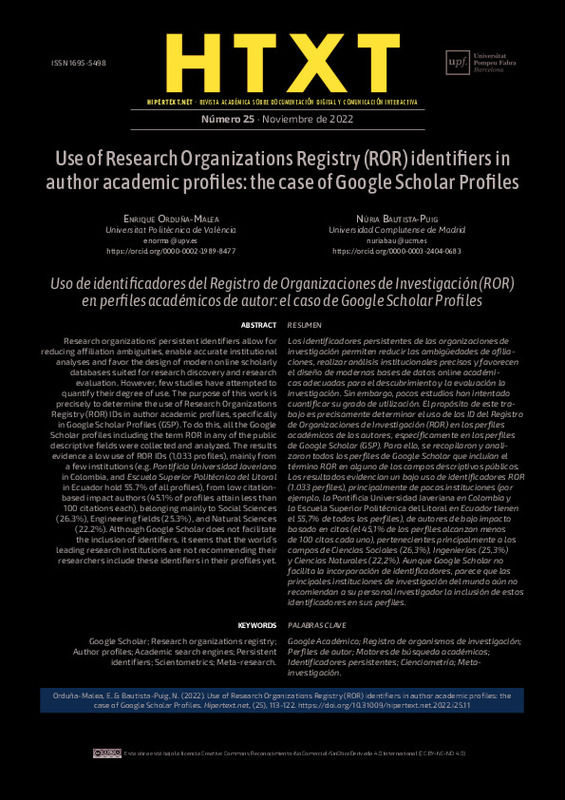JavaScript is disabled for your browser. Some features of this site may not work without it.
Buscar en RiuNet
Listar
Mi cuenta
Estadísticas
Ayuda RiuNet
Admin. UPV
Use of Research Organizations Registry (ROR) identifiers in author academic profiles: the case of Google Scholar Profiles
Mostrar el registro sencillo del ítem
Ficheros en el ítem
| dc.contributor.author | Orduña Malea, Enrique
|
es_ES |
| dc.contributor.author | Bautista-Puig, Núria
|
es_ES |
| dc.date.accessioned | 2022-12-09T19:00:23Z | |
| dc.date.available | 2022-12-09T19:00:23Z | |
| dc.date.issued | 2022 | es_ES |
| dc.identifier.issn | 1695-5498 | es_ES |
| dc.identifier.uri | http://hdl.handle.net/10251/190534 | |
| dc.description.abstract | [EN] Research organizations¿ persistent identifiers allow for reducing affiliation ambiguities, enable accurate institutional analyses and favor the design of modern online scholarly databases suited for research discovery and research evaluation. However, few studies have attempted to quantify their degree of use. The purpose of this work is precisely to determine the use of Research Organizations Registry (ROR) IDs in author academic profiles, specifically in Google Scholar Profiles (GSP). To do this, all the Google Scholar profiles including the term ROR in any of the public descriptive fields were collected and analyzed. The results evidence a low use of ROR IDs (1,033 profiles), mainly from a few institutions (e.g. Pontificia Universidad Javeriana in Colombia, and Escuela Superior Politécnica del Litoral in Ecuador hold 55.7% of all profiles), from low citationbased impact authors (45.1% of profiles attain less than 100 citations each), belonging mainly to Social Sciences (26.3%), Engineering fields (25.3%), and Natural Sciences (22.2%). Although Google Scholar does not facilitate the inclusion of identifiers, it seems that the world¿s leading research institutions are not recommending their researchers include these identifiers in their profiles yet. | es_ES |
| dc.description.abstract | [ES] Los identificadores persistentes de las organizaciones de investigación permiten reducir las ambigüedades de afiliaciones, realizar análisis institucionales precisos y favorecen el diseño de modernas bases de datos online académicas adecuadas para el descubrimiento y la evaluación la investigación. Sin embargo, pocos estudios han intentado cuantificar su grado de utilización. El propósito de este trabajo es precisamente determinar el uso de los ID del Registro de Organizaciones de Investigación (ROR) en los perfiles académicos de los autores, específicamente en los perfiles de Google Scholar (GSP). Para ello, se recopilaron y analizaron todos los perfiles de Google Scholar que incluían el término ROR en alguno de los campos descriptivos públicos. Los resultados evidencian un bajo uso de identificadores ROR (1.033 perfiles), principalmente de pocas instituciones (por ejemplo, la Pontificia Universidad Javeriana en Colombia y la Escuela Superior Politécnica del Litoral en Ecuador tienen el 55,7% de todos los perfiles), de autores de bajo impacto basado en citas (el 45,1% de los perfiles alcanzan menos de 100 citas cada uno), pertenecientes principalmente a los campos de Ciencias Sociales (26,3%), Ingenierías (25,3%) y Ciencias Naturales (22,2%). Aunque Google Scholar no facilita la incorporación de identificadores, parece que las principales instituciones de investigación del mundo aún no recomiendan a su personal investigador la inclusión de estos identificadores en sus perfiles | es_ES |
| dc.description.sponsorship | This project has been supported by the project UNIVERSEO (Ref. GV/2021/141), funded by the regional government (Generalitat) of Valencia (Spain). | es_ES |
| dc.language | Inglés | es_ES |
| dc.publisher | Universidad Pompeu Fabra | es_ES |
| dc.relation.ispartof | Hipertext.net | es_ES |
| dc.rights | Reconocimiento - No comercial - Sin obra derivada (by-nc-nd) | es_ES |
| dc.subject | Google Scholar | es_ES |
| dc.subject | Research organizations registry | es_ES |
| dc.subject | Author profiles | es_ES |
| dc.subject | Academic search engines | es_ES |
| dc.subject | Persistent identifiers | es_ES |
| dc.subject | Scientometrics | es_ES |
| dc.subject | Meta-research | es_ES |
| dc.subject | Google Académico | es_ES |
| dc.subject | Registro de organismos de investigación | es_ES |
| dc.subject | Perfiles de autor | es_ES |
| dc.subject | Motores de búsqueda académicos | es_ES |
| dc.subject | Identificadores persistentes | es_ES |
| dc.subject | Cienciometría | es_ES |
| dc.subject | Metainvestigación | es_ES |
| dc.subject.classification | BIBLIOTECONOMIA Y DOCUMENTACION | es_ES |
| dc.title | Use of Research Organizations Registry (ROR) identifiers in author academic profiles: the case of Google Scholar Profiles | es_ES |
| dc.title.alternative | Uso de identifcadores del Registro de Organizaciones de Investigación (ROR) en perfles académicos de autor: el caso de Google Scholar Profles | es_ES |
| dc.type | Artículo | es_ES |
| dc.identifier.doi | 10.31009/hipertext.net.2022.i25.11 | es_ES |
| dc.relation.projectID | info:eu-repo/grantAgreement/GENERALITAT VALENCIANA//GV%2F2021%2F141//Posicionamiento académico web de las universidades españolas: diseño y aplicación de un modelo de análisis multinivel y multidimensional (UniverSEO)/ | es_ES |
| dc.rights.accessRights | Abierto | es_ES |
| dc.contributor.affiliation | Universitat Politècnica de València. Facultad de Bellas Artes - Facultat de Belles Arts | es_ES |
| dc.description.bibliographicCitation | Orduña Malea, E.; Bautista-Puig, N. (2022). Use of Research Organizations Registry (ROR) identifiers in author academic profiles: the case of Google Scholar Profiles. Hipertext.net. (25):113-122. https://doi.org/10.31009/hipertext.net.2022.i25.11 | es_ES |
| dc.description.accrualMethod | S | es_ES |
| dc.relation.publisherversion | https://doi.org/10.31009/hipertext.net.2022.i25.11 | es_ES |
| dc.description.upvformatpinicio | 113 | es_ES |
| dc.description.upvformatpfin | 122 | es_ES |
| dc.type.version | info:eu-repo/semantics/publishedVersion | es_ES |
| dc.description.issue | 25 | es_ES |
| dc.relation.pasarela | S\478398 | es_ES |
| dc.contributor.funder | GENERALITAT VALENCIANA | es_ES |








